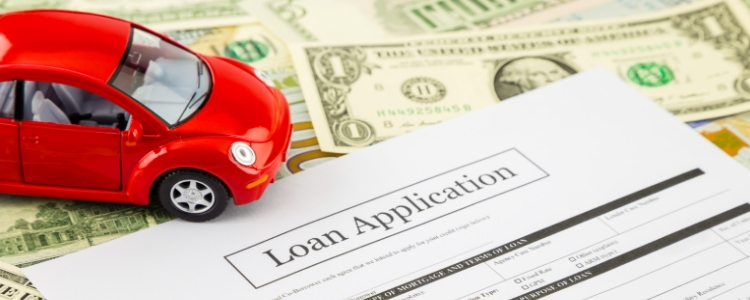When you’re getting your very first auto loan, it can be useful to have a cosigner. However, it may not always be necessary depending on the lender you’re financing through. Here’s how cosigners work, how they help, and lenders that may not require you to have one.
First-Time Car Buyers and Cosigners
If you’re putting yourself on the path to your first car loan, it can be a lot to manage. And one of the toughest humps you may have to get over is your credit score.
Many first-time car buyers have less than perfect credit – not because of past missed payments on other loans but simply due to lacking credit history. Borrowers without multiple accounts or years of on-time payments aren’t likely to have a spectacular credit score just yet, because they haven’t proven their ability to repay credit. Without a track record of good loan management, a lender may be hesitant to approve you for vehicle financing.
Since new borrowers tend to have lower credit scores, many auto lenders require them to have a cosigner to qualify for a car loan. A cosigner is someone who signs onto the auto loan with you and lends you their good credit score to help you meet the requirements of the lender. Additionally, the cosigner promises to repay the car loan if you’re unable to. Since there are two people responsible for the loan, there’s less of a chance of things going amiss, so having a cosigner increases your approval odds.
It’s entirely possible that an auto lender is going to require you to have a cosigner for your first car loan if your credit score isn’t up to snuff. However, that doesn’t mean that every lender from here on out is going to have the same requirements or ask you to bring a cosigner.
Evaluating Your Credit Health
A good starting point to getting your first auto loan is checking your credit reports and credit score. This way, you can see where you land on the credit score spectrum, and know what the lender will see. Even if you don’t think there’s a lot on them, review your credit reports and make sure everything on them is correct. You can also look up average interest rates for borrowers in a similar range as you.
Each of the three major credit reporting agencies – TransUnion, Equifax, and Experian – may have different information reported, so check all three to make sure everything lines up and looks good. If you see any mistakes or inconsistencies, you can dispute them and try to get them removed. A negative mark on your credit reports (even if it’s wrong) can lower your credit score, so comb through them carefully.
You can request your credit reports for free from www.annualcreditreport.com. Ever since the coronavirus pandemic, the credit bureaus are allowing borrowers to view their reports for free weekly until December 2023. After that, it reverts back to allowing one free report from each bureau every 12 months.
Budgeting For Your First Auto Loan
Your next step is to evaluate your budget for your auto loan. You can do this by finding out your debt-to-income (DTI) and payment-to-income (PTI) ratios. These will help you stay on track while seeing what you can afford.
- Payment-to-income ratio – A payment-to-income ratio lets a lender know what a maximum monthly payment is going to be for you. Subprime lenders typically don't accept a car payment that's more than 15% to 20% of your income. To find out your maximum PTI ratio, simply multiply your pre-tax monthly income by 0.15, and then multiply it by 0.20 to give you a maximum payment range. For example: If you make $3,900 a month before taxes, you would be capped at between $585 and $780 a month for an auto loan payment.
- Debt-to-income ratio – Your debt-to-income ratio shows a lender how much of your income is already set aside for your bills. Now that you know what your ideal payment range is, you can calculate how much of your income is used by your bills, including your estimated car loan and auto insurance payments. To calculate your DTI ratio, add up all of your monthly bills, including the new car loan and insurance, and divide the total by your pre-tax monthly income. Bad credit lenders typically require a DTI ratio of 45% to 50% or lower in order to approve you for an auto loan.
When you're determining how much of your check you need to save for your auto loan, don't forget about saving for a down payment. First-time car buyers are more likely to need a down payment, especially if they're not using a cosigner.
How To Get a Car Loan Without a Cosigner
Depending on your situation, you may have quite a few options to explore if you don’t have a cosigner. Lenders that often assist new borrowers generally include:
 Credit unions
Credit unions
- Credit unions are often the recommended first stop for a brand-new borrower looking for an auto loan. These institutions can often offer savings over big banks and may have less fees when you're looking for a loan. If you’re a member of a credit union and your accounts are in good standing, then they may be willing to work with your thin credit profile. It’s not a guarantee that they can approve you without a good credit score, but these institutions are member-owned and tend to be more lenient on credit score requirements, so it’s worth a shot. Remember that you must meet their other requirements, such as income and work history stipulations, and you may need a down payment. Since credit unions are member-owned and not accountable to large shareholders, they are typically able to pass their savings on to customers.
Subprime Lenders
- Special financing is an umbrella term for auto loans for borrowers with bad credit. Subprime lenders signed up with special finance dealerships often have first-time car buyer programs that may not require you to have a cosigner to qualify. These lenders look at more than your credit score, using factors such as your income, employment history, debt-to-income ratio, living stability, and your down payment amount to qualify you for financing. For borrowers with poor credit that don’t have the help of a cosigner, a subprime lender may be the ticket to a car loan. Subprime lenders are third-party lenders, and you can't meet with one directly. Instead, you meet with a financial manager at a dealership who will present your application to their lenders to see who can help to get you financed.
While it seems like you only have two main options, credit unions are very plentiful. The catch with these institutions is that you usually need to meet certain criteria to become a member, such as living in the area, holding student status, or being a veteran. Additionally, the longer you’ve been a member of your personal credit union, typically the higher your approval odds are. Subprime lenders are plentiful, as well. Special finance dealerships are all over the country, but not always as easy to locate. Many dealers don’t advertise their lending partners, but if a subprime lender is what you think your next step is, we want to help.
Finding a Dealership That Assists First-Time Car Buyers
When it comes to finding a dealership that helps first-time car buyers, you may have to do some legwork. Not all lenders are willing to work with borrowers who have less-than-perfect credit due to little or no credit history. In these situations searching for a credit union or subprime lender may be your best bet. If you're having trouble finding the right dealership for you, we want to help.
At Auto Credit Express, we’ve cultivated a coast-to-coast network of dealerships that are able to assist borrowers with credit challenges. If you're in need of dealer connections, let us do the hard work of tracking one down for you.
Fill out our free auto loan request form and we’ll look for a dealership in your local area at no cost and with no obligation.


















